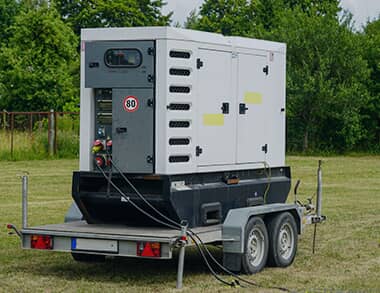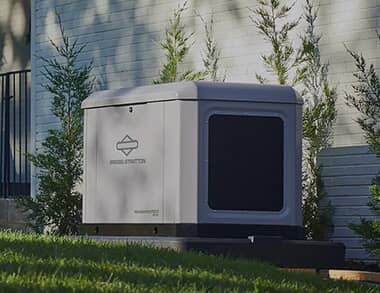Staying Alert for Problems With Your Industrial Air Compressor

It's essential to closely monitor your air compressor for signs of component failure or blockage, in the event that a problem suddenly develops. It is also imperative to comply with all regular maintenance and service requirements for the unit. At Gen-Tech, our repair technicians have seen every problem you can imagine, and the following are some common problems you should keep an eye out for with your system.
Air leaks can occur in the compressor, oil fill tube, hood, and hoses. If you notice a sharp decrease in air pressure, there is a good chance it's because of a leak. To test for leaks, turn the air compressor off and apply a bit of liquid soap to the connections, couplers, and pressure switch. Switch the unit on and watch for bubbles. If any bubbles appear, tighten the connection, reapply soap, and see if that solves the issue. You can also apply this technique to test the hose for any pinpoint leaks. Piston seals are another common point of leaks. If, after the above tests, you still have leaks, inspect the oil fill tube for signs the piston seal is damaged or worn.
It is important to remember that our air compressor should be hard-wired into the building. If you are connecting via an extension cord, you can cause the motor to overheat, which can trip the breaker. You should also check the fuse to ensure it is properly sized for the air compressor you are using. Another common cause of blown fuses and tripped breakers are worn out motors. As the air compressor ages, the windings, capacitor wires, and other components will wear out, which can lead to electrical shorts.
If the motor is running and there's little to no air pressure, it could be because you have a faulty air-intake pump or worn out gasket. One way to test this is to place a gloved hand next to the pump to feel for air pressure manually.
Oil can clog and damage air hoses with ease. If oil or other debris leaks into the hose, it can damage other components within your air compressor. In particular, plastic components can quickly break down, become brittle, and fail. If you discover oil in your air lines, check the piston seals and pumps for signs of damage and repair these to stop the leak. It would be best if you never attempted to continue operating an air compressor until this problem is properly repaired.
Always make sure that each component is lubricated correctly, with sufficient amounts of the appropriate lubricant in the respective reservoir. Improper lubrication is the top reason that parts seize up and fail.
Contact the team at Gen-Tech Power Generation Specialists at (800) 625-8324 for more information about the air compressors we sell and the maintenance services we offer to keep your air compressor running at full capacity.
Look for Leaks
Air leaks can occur in the compressor, oil fill tube, hood, and hoses. If you notice a sharp decrease in air pressure, there is a good chance it's because of a leak. To test for leaks, turn the air compressor off and apply a bit of liquid soap to the connections, couplers, and pressure switch. Switch the unit on and watch for bubbles. If any bubbles appear, tighten the connection, reapply soap, and see if that solves the issue. You can also apply this technique to test the hose for any pinpoint leaks. Piston seals are another common point of leaks. If, after the above tests, you still have leaks, inspect the oil fill tube for signs the piston seal is damaged or worn.
Check the Electrics & Motors
It is important to remember that our air compressor should be hard-wired into the building. If you are connecting via an extension cord, you can cause the motor to overheat, which can trip the breaker. You should also check the fuse to ensure it is properly sized for the air compressor you are using. Another common cause of blown fuses and tripped breakers are worn out motors. As the air compressor ages, the windings, capacitor wires, and other components will wear out, which can lead to electrical shorts.
Test the Pump and Gaskets
If the motor is running and there's little to no air pressure, it could be because you have a faulty air-intake pump or worn out gasket. One way to test this is to place a gloved hand next to the pump to feel for air pressure manually.
Clear the Hose
Oil can clog and damage air hoses with ease. If oil or other debris leaks into the hose, it can damage other components within your air compressor. In particular, plastic components can quickly break down, become brittle, and fail. If you discover oil in your air lines, check the piston seals and pumps for signs of damage and repair these to stop the leak. It would be best if you never attempted to continue operating an air compressor until this problem is properly repaired.
Check Lubricant Levels
Always make sure that each component is lubricated correctly, with sufficient amounts of the appropriate lubricant in the respective reservoir. Improper lubrication is the top reason that parts seize up and fail.
Contact the team at Gen-Tech Power Generation Specialists at (800) 625-8324 for more information about the air compressors we sell and the maintenance services we offer to keep your air compressor running at full capacity.
Topics:
From Insights to Power: Let’s Talk Solutions
Whether you need emergency power, maintenance, or expert guidance on your generator system, Gen-Tech has you covered. Our experienced team provides industry-leading service to keep your power running when it matters most. Call (800) 625-8324 to discuss your power generation needs today!
Contact Us













